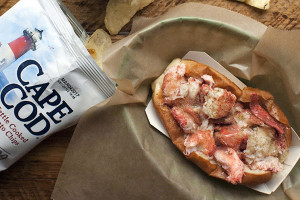Dining Out: Trade
Whole roasted fish ($24) was similarly transformed in that charmed oven, and shone in its crisp-skinned, moist-fleshed simplicity. The smashed fingerlings beside it, spiced with coriander, cumin, and paprika, were oily, hot, and addictive; they’re also available as a side for $5, and would be great with drinks. The oven did wonders for red-wine-marinated short ribs ($27), as well, served on the bone in a cast-iron pot. It’s so nice to have ribs braised for three hours in an oven rather than cooked sous-vide, as is so common these days, since roasting yields a pleasant crust. Oranges and olives gave the ribs a Mediterranean flavor, and while the accompanying Jerusalem artichokes seemed bitsy and mealy for such a hearty dish, a daikon-ginger slaw freshened the plate. Plancha-seared chicken ($24) is spatchcocked (who can resist that word, which means boned except for the leg and winglet?), with herbs stuffed between the meat and marvelously charred skin. With seared orange sections, sweet dates, and quinoa cooked in a wine-and-saffron broth, it was an excellent dish. The one outright failure on the menu was a seafood stew ($25) in a ginger-lemongrass broth with coconut milk and vermicelli noodles — a wan, watery waste of good local shellfish.
.jpg) Whether they’re listed as small plates or “a little extra,” a.k.a. sides, the vegetable dishes excel. Hebert irresistibly blackens baby Brussels sprouts, pairing them with a smoky romesco sauce made with sweet-hot Aleppo pepper and hazelnuts ($7). But nothing tops the pillowy, steak-cut roasted eggplant glazed with pomegranate molasses and topped with olive tapenade and garlic yogurt ($8; shown right). People often claim eggplant is a terrific substitute for meat, and here, finally, it is. I found myself lapping up the yogurt sauce. But what made the dish was the sweetness of the molasses, pomegranate seeds, and mint leaves combined with lots of salt from anchovies and capers. The thick, flat slice looks like an individual tart, and given the current vogue for mixing salt and sugar, it could even be a dessert.
Whether they’re listed as small plates or “a little extra,” a.k.a. sides, the vegetable dishes excel. Hebert irresistibly blackens baby Brussels sprouts, pairing them with a smoky romesco sauce made with sweet-hot Aleppo pepper and hazelnuts ($7). But nothing tops the pillowy, steak-cut roasted eggplant glazed with pomegranate molasses and topped with olive tapenade and garlic yogurt ($8; shown right). People often claim eggplant is a terrific substitute for meat, and here, finally, it is. I found myself lapping up the yogurt sauce. But what made the dish was the sweetness of the molasses, pomegranate seeds, and mint leaves combined with lots of salt from anchovies and capers. The thick, flat slice looks like an individual tart, and given the current vogue for mixing salt and sugar, it could even be a dessert.
That might be a better finale than the ones that were actually on the dessert menu when I was there. The Taza chocolate budino with sea salt, rosemary, and a hazelnut wafer ($9), for instance, featured a nicely salty wafer, but the thick-set pudding was just ordinary. A New England take on baked Alaska with pecans, maple sorbet, and cranberries ($9) was an oddly ascetic dessert; the meringue was disappointingly anemic, but the sorbet was as refreshing as snow. The Maine apple crostata ($8), however, took full advantage of the oven. I’d like to see more experimentation with baked tarts, given the kitchen’s success rate with flatbreads and oven-roasted entrées. But I have to admit: I’m looking for things to criticize. Provided I can hear myself think — and hear the people around me talk — I’ll be back to Trade, and often.
Trade, 540 Atlantic Ave., Boston, 617-451-1234, trade-boston.com.

